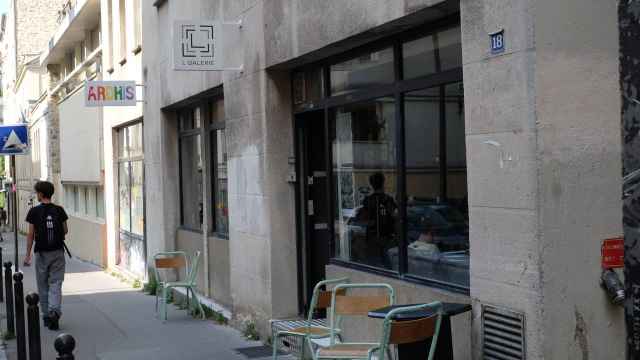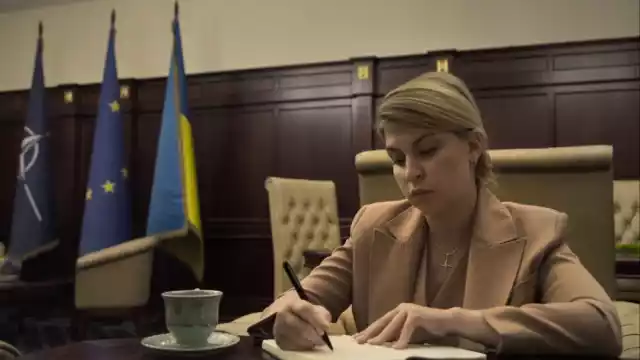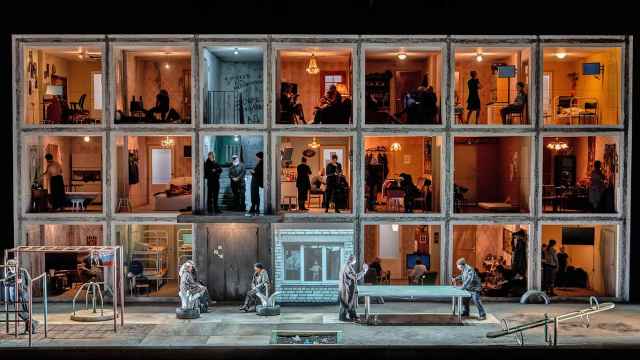I'm not good with dates. So for those who are sticklers about anniversaries this article is decidedly late.
On the other hand, the reasons compelling me to choose this topic only came together during the first two weeks of September. Ultimately, what concerns me is less the fact that Alexei Kazantsev died three years ago, on September 5, 2007, than the fact that the work this playwright, director, producer and theatrical activist did over the last twenty years of his life continues to transform and grow.
I dug back into my dusty photo albums and found a shot of Kazantsev, my wife Oksana Mysina, the playwright Lyudmila Razumovskaya and myself taken at the Maly Drama Theater in St. Petersburg in 1998. What a different theater world it was then!
Kazantsev was still months away from opening the Playwright and Director Center in Moscow. New plays were still rare and unwanted guests on Russia's stages. Almost all of the major theaters in Moscow were being run by artistic directors who began their careers in the 1950s or 1960s, if not the 1920s (Valentin Pluchek at the Satire Theater) or the 1930s (Yury Lyubimov at the Taganka Theater).
With apologies to James Brown, we can say it was an old, old, old man's world.
Kazantsev was 61 when he died. He was days from turning 54 when he founded the Playwright and Director Center, and he was about 48 in 1993 when he launched the journal Playwright, which began forcing the Russian theater world to admit that contemporaries were writing interesting plays. Regardless of his age, everything Kazantsev did was connected with, and drew on, youth ― his own and that of others.
Now, I ran a preview of the upcoming 2010-2011 theater season in the real and virtual pages of this newspaper about two weeks ago. And in that piece I pointed out that the coming months promise a rich selection of new works by major contemporary writers. We soon will witness new productions of plays by the Presnyakov brothers, Ivan Vyrypayev, Yury Klavdiyev and Pavel Pryazhko.
For all intents and purposes, none of these writers existed when Kazantsev opened the Playwright and Director Center in 1999. Every one of them, each now a major force in contemporary Russian theater, owes a deep debt to Kazantsev. It was Kazantsev who refused to accept the status quo, who flew in the face of the received wisdom that no one was writing plays worth staging.
The Lyubimovka play festival, which ran from Sept. 4 to 12, and attracted international attention for its presentation of more than 40 new works by famous and unknown writers alike, is a modern version of the old Lyubimovka festival that Kazantsev himself ran in the 1990s. Its current artistic director, Yelena Kovalskaya, as well as her predecessor, Yelena Gremina ― to say nothing of all the writers presented there ― are indebted to Kazantsev.
On Wednesday last week Vladimir Pankov unveiled his latest production, a reinvention of Yury Klavdiyev's "I Am the Machine Gunner." (I will publish a review of this on Thursday.)
Pankov, whose SounDrama Studio is now one of the most popular and innovative companies in town, essentially began his professional career as an actor and director at the Playwright and Director Center in such now-legendary shows as "Plasticine," "Oblom Off" and "Red Thread." Klavdiyev debuted in Moscow in early 2006 with two plays opening simultaneously at two venues, Praktika and ― where else? ― the Playwright and Director Center.
I remember discussing Klavdiyev twice with Kazantsev. The first time, we were sitting in Kazantsev's study at his home. This would have been 2005, probably early in the summer. Kazantsev was talking about the growing number of new plays that unknown writers were sending him. He was concerned that everyone seemed interested in copying the formula of gritty, down-and-dirty writing that had been popularized through Vasily Sigarev's "Plasticine" at the Playwright and Director Center.
"But there's this new guy from Togliatti," Kazantsev said. "And I think he's the real thing. He's very strong. Very off-putting in some ways. But very strong. Yury Klavdiyev."
The second time was during a late-night call from Kazantsev following the premiere of Klavdiyev's "Let's Go a Car Awaits Us" at the Playwright and Director Center on Feb. 27, 2006.
I must say as an aside that Kazantsev had a habit, if not a tradition, of calling me at exactly 11:45 p.m. Whenever the phone would ring at that hour, I would invariably say to my wife ― "It's Kazantsev" ― and I invariably would be right.
I must also say that I hate having to talk to directors, or anybody else, about shows before I have had a chance to write about them. It's what makes me run out of theaters after the curtain drops like a scalded cat, head down like a panicked thief. If this says something unpleasant about me, so be it.
I mention this because Alexei Kazantsev also always called me at 11:45 p.m. on nights when I attended premieres at his theater. He unquestionably knew I was in attendance, even if I was sure I succeeded in slipping out unseen. God knows I tried. But nothing missed Alexei's careful, watchful eye. He always wanted to know my reaction and I always dreaded having to give it ― even when it was positive, which it usually was.
This night the conversation quickly took a different turn.
There had been a bit of a commotion that night when Kazantsev called Klavdiyev up to join the curtain calls. A woman sitting in front of me had angrily muttered to a neighbor that "people like that should not be allowed on stage!" Kazantsev heard similar observations.
Klavdiyev, you see, although quickly becoming a highly respected playwright, was ever faithful to his deeply iconoclastic nature. His hair was coiffed in a Mohawk-type cut, and it was colored some shade of violet or pink. It seemed he had metal studs and heavy chains hanging from every corner of his clothing and exposed skin.
It was quite a sight. Here was the moment when the days of the sartorial playwright with the ascot tastefully fitted around his neck came crashing up against the modern world. At least in Russia.
Kazantsev was furious. That is, he was furious at those who had criticized Klavdiyev's appearance.
"Who gives a damn what he looks like?" Kazantsev said heatedly. "What's that have to do with anything? The guy is a talented writer!"
That's what Alexei Kazantsev was all about: discovering and nurturing talent. Everything else was so much chaff.
The legacy that he left Russian theater is staggering.
Kazantsev published, championed or produced virtually every important writer who has appeared in Russia over the last decade. Through the Playwright and Director Center, he gave kick-starts to the careers of numerous young directors who have now assumed celebrated careers in theater, television and film. He helped educate a whole new generation of spectators who are interested in whatever is new and challenging.
As the current season gets underway, three years after Kazantsev's death, the evidence of his influence on Russian theater only increases.
A Message from The Moscow Times:
Dear readers,
We are facing unprecedented challenges. Russia's Prosecutor General's Office has designated The Moscow Times as an "undesirable" organization, criminalizing our work and putting our staff at risk of prosecution. This follows our earlier unjust labeling as a "foreign agent."
These actions are direct attempts to silence independent journalism in Russia. The authorities claim our work "discredits the decisions of the Russian leadership." We see things differently: we strive to provide accurate, unbiased reporting on Russia.
We, the journalists of The Moscow Times, refuse to be silenced. But to continue our work, we need your help.
Your support, no matter how small, makes a world of difference. If you can, please support us monthly starting from just $2. It's quick to set up, and every contribution makes a significant impact.
By supporting The Moscow Times, you're defending open, independent journalism in the face of repression. Thank you for standing with us.
Remind me later.






